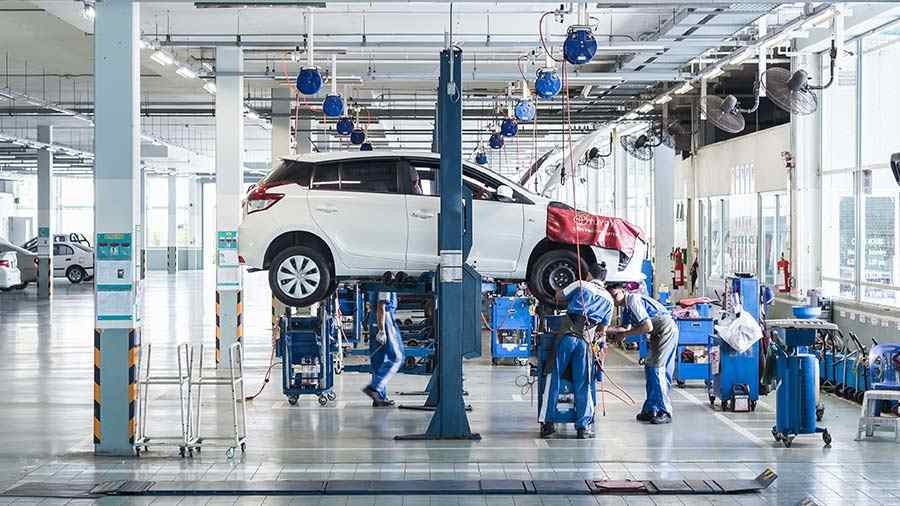Thailand’s automotive industry at a crossroads

Thailand's automotive industry stands at a crossroads. While it remains a significant player in the ASEAN region, its traditional strengths are under pressure from global trends and domestic challenges.
Thailand, formerly known as "the Detroit of Asia," is losing its competitive edge as a major auto production hub and exporter, as overseas buyers are increasingly switching to Electric Vehicles (EVs). Although the country has attracted investments from several Chinese EV manufacturers such as BYD and Great Wall Motor, bolstered by the government's EV subsidy program, the burgeoning EV sector has yet to compensate for the slack in local production.
Projections for Thailand's Light Vehicle (LV) production in 2024 indicate a 17% decrease, with output expected to reach only 1.51 million units. This decline, driven by weak domestic sales
It is worth noting that over the past decade exports have comprised roughly 60% of Thailand’s vehicle production. Currently, Thai LV exports are encountering heightened pressure in their export markets due to economic slowdowns in some key markets, geopolitical tensions, and the increasing dominance of Chinese-made vehicles as China broadens its global footprint. Note that Thailand is positioned as a crucial hub for Japanese automakers manufacturing in the region.
The challenges are evident in the export performance of major Japanese automakers, which dominate Thailand’s production landscape. From January to September 2024, Toyota’s exports fell by nearly 13%
(-37k units), while Mitsubishi experienced a decline of 16.3% (-31k units). Nissan and Isuzu also reported a reduction of 19.8% (-12k units) and 7.8% (-7k units), respectively. These figures highlight the mounting pressures on Thailand’s export-dependent automotive industry.
Regarding the domestic market, the Thai automotive market is struggling under the weight of mounting challenges, with LV sales for the first nine months of 2024 totaling just 434k units—a sharp 23% YoY decline. Several factors are contributing to this slump.
1) High financing costs and stringent credit conditions: Financial institutions have imposed stricter credit approvals, creating a significant barrier to vehicle purchases. This is particularly true for Pickup Truck buyers, many of whom are self-employed or in an informal business sector. With loan rejection rates soaring to 20-30%, many potential customers cannot access financing. This is especially significant as Pickup Trucks dominate Thailand’s market, accounting for 96% of Light Commercial Vehicle (LCV) sales.
2) Elevated level of household debt: Thailand’s household debt has risen sharply, climbing from 80% of GDP pre-pandemic to 90% of GDP by Q2 2024, ranking among the highest in the region. This elevated debt burden limits consumers' ability to secure additional loans, directly impacting vehicle demand.
3) Delayed government budget approval: The government did not approve the FY2024/25 budget until April this year, which should have been approved in October 2023. That has stalled public projects and has had a ripple effect, further suppressing sales, particularly in the LCV segment.
4) Challenges in the Battery Electric Vehicle (BEV) market: The BEV market, often seen as a potential growth area, has also faced setbacks. The expiration of the government's BEV subsidies under the EV 3.0 scheme on January 31, 2024 has suppressed BEV sales. Note that the government has launched the second phase, known as the "EV 3.5 program", which took effect earlier this year. This program continues to offer a cash subsidy, although the incentives have been scaled down compared to the previous program. Moreover, price wars led by Chinese automakers have also stifled BEV sales, as financial institutions have become hesitant to finance Chinese brands due to rapid price depreciation. As such they have tightened lending criteria, for example by requiring a higher amount of down payment or refusing financing for these vehicles altogether. Note that BEVs accounted for 13% of total Passenger Vehicle (PV) registrations in the first nine months of 2024.
5) Natural disasters: The severe flooding in September and October has also negatively impacted sales, with the possibility that some consumers may postpone their purchases from the fourth quarter of 2024 to 2025. These events not only hindered sales but also shifted consumer priorities toward essential spending, further weakening demand in an already weak market.
The cumulative impact of these factors has pushed Thailand’s automotive industry into one of its most challenging periods. We expect Thai LV sales to decline by 24% YoY in 2024, falling to just 568k units—the lowest annual sales volume in 15 years and the steepest decline since the global financial crisis in 2009.
Despite the bleak outlook for 2024, there are glimmers of hope for recovery in 2025, even with risks skewed to the downside. Lower interest rates, postponed demand, and the introduction of new vehicle models are likely to support a rebound. The anticipated launch of the next-generation Toyota Hilux, for instance, is expected to drive LCV demand significantly. From January to September 2024, Hilux models alone accounted for 12% of LV sales, underscoring their importance to the market. GlobalData forecast a 15% growth in LV sales in 2025, reaching 637k units. However, this figure remains below pre-pandemic levels (1 million units in 2018) and pandemic-era volumes (783k units in 2020).
However, long-term growth will depend on addressing structural issues, including high household debt, demographic shifts, and slower economic growth. These underlying challenges continue to cast a shadow over Thailand’s automotive market, even as it retains its position as ASEAN’s largest vehicle producer.
Tags :
Previous Story
- Top Auto Parts Suppliers and Essential Components for...
- Transforming the Automotive Industry - The Influence of...
- These autoworkers just achieved what the UAW couldn't
- Transforming the Auto Industry: Automotive Tools at the...
- Automobile Market: Exploring Trends, Industry Insights, and Product...
- Tesla Cuts China Prices Again, Triggering Slump in...
- Automobile Accessories Market: Unlocking the Latest Trends and...
- Hyundai to consider joining Tesla's North American charging...